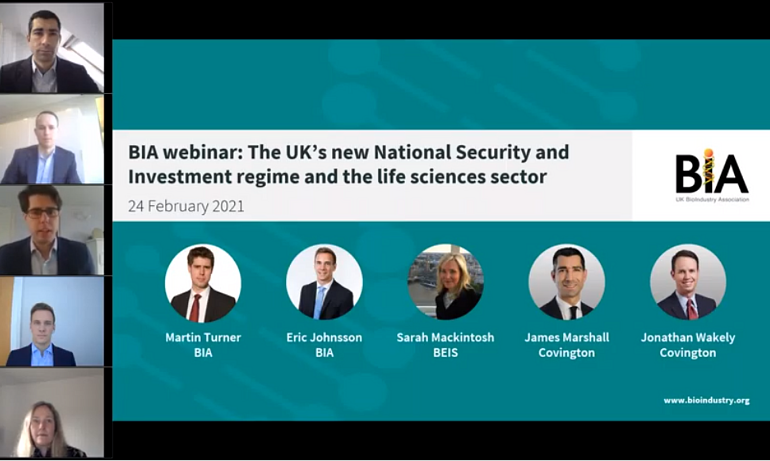National Security and Investment Bill Webinar Q&A
Last month, the BIA hosted a webinar to delve deeper into the impact of the National Security and Investment Bill on the UK life sciences sector and hear from members about their concerns. In this blogpost, we provide answers to the remainder of questions which came up in the session.
The webinar was hosted by the BIA’s Martin Turner, who was joined by Eric Johnsson from the BIA, expert lawyers James Marshall and Jonathan Wakely from Covington & Burling LLP and Sarah Mackintosh, Deputy Director of National Security and Investment at the Department for Business, Energy and Industrial Strategy (BEIS).
All information on the National Security and Investment Bill provided by the BIA is correct as of 26 March 2021, is based on the current draft of the legislation and to the best of our knowledge. Information provided represents only high-level guidance, is not intended to be legal advice and should not be used as such.
Scope of the regime
- The AI sector is a particular area of concern for BIA members with respect to the new regime due to the number of deals. What other sectors are you noticing are areas of concern?
The definition of AI has been redrafted to focus on three higher risk applications (identification of objects, people and events, advanced robotics and cyber security), and on AI looking at ‘cognitive tasks’, rather than just ‘complex’ tasks. This is a significant improvement and allays many original concerns.
The other sector of concern to the BIA is Synthetic Biology (formerly Engineering Biology) as explained in the answer below.
- What does the sector definition of “Engineering Biology” cover in practice? Which type of businesses and assets?
The definition of “Engineering Biology” has been significantly changed following the Government consultation and the new definition of Synthetic Biology can be found in the Government’s consultation response here. This definition, however, is not final and may still be subject to change ahead of being published in secondary legislation later this year.
All businesses whose work is classified as Synthetic Biology according to the Government’s definition that do not qualify for any of the exemptions are covered by this. Assets are either land; tangible (or, in Scotland, corporeal) movable property; or ideas, information or techniques which have industrial, commercial or other economic value. Examples of assets include trade secrets; databases; source code; algorithms; formulae; designs; plans, drawings and specifications; and software.
- Following the pandemic will the Government regard investment in vaccine technology as having national security implications?
Vaccine technology captured by the current sector definition of Synthetic Biology would be subject to mandatory notification under this regime.
- Many industry academic collaboration revolve around sharing of IPR generated during R&D projects. Could these collaborative projects fall into a category requiring notification?
Acquiring control over an asset, like IP, doesn’t qualify for the mandatory notification regime. If acquiring control of an asset could raise a national security risk, either the acquirer can submit a notification under the voluntary notification scheme, or BEIS could call this in to be investigated up to five years after control is acquired.
How the regime will work in practice
- Is the mandatory notification period 30 days or 30 working days (6 weeks)?
Once the mandatory notification has been submitted and accepted by BEIS, it has 30 working days to carry out the initial assessment. If BEIS chooses to call-in the investment for a national security assessment after this initial assessment, it has a further 30 working days to carry this out, though this can be extended to 45 working days. If it requires further information for this assessment, the clock is stopped until this has been received.
- If not approved on time, has BEIS considered auto-approve to not lose UK foreign direct investment?
This provision isn’t set out in the bill as it currently stands.
- Ahead of the regime coming into force, how quickly is BEIS reverting on informal views if parties wish to come forward with a deal? How much time should parties build into their deal timetable?
Currently, BEIS is responding to queries within a few business days, and often turning around straightforward responses within a matter of hours.
- Are transactions currently taking place affected by this?
Any transactions that took place on or after 12 November 2020 will be subject to this new regime.
- Are there penalties for failing to notify if notification was not mandatory?
No, the relevant penalties are only applicable where notification is mandatory.
- Is the Government concerned about companies creating a HQ in another country so they no longer fall under UK law when buying shares in their Holding company?
The legislation has extra-territorial effect, so if a company had activities in the UK, it may be covered by the national security and investment regime.
- If an existing shareholder invests and turns from a non-controlling stake to a controlling stake (or substantial stake), are they still exempt?
If this investment meets any of the notification thresholds (15%, 25%, 50% or 75%), or means the shareholder now has material influence over the company, and the company is in one of the 17 sensitive sectors, mandatory notification applies.
- Can you give an overview of the type of transactions caught? Share acquisitions, business acquisitions, but also licences/options?
Share acquisitions, both direct and indirect, are within scope of the regime. Asset transactions (occurring as a business acquisition or an individual licence) may also be subject to review but are outside of mandatory notification requirements. Options over shares may trigger notification requirements and should be individually reviewed to determine if and when notification applies.
- Some companies have had queries from before November 2020. What can companies do to mitigate any issues?
As well as seeking legal advice, companies can contact the new Investment Security Unit (within BEIS) to get informal guidance.
- How will BEIS look at transactions that have already been completed?
Transactions that took place on or before 11 November 2020 are not subject to the National Security and Investment regime. Only transactions occurring on or after 12 November 2020 but before the National Security and Investment law comes into force may be called-in for review if national security concerns are identified by BEIS, but are not subject to notification requirements (although may be notified voluntarily to BEIS or guidance sought).
- Can voluntary notifications be made now to BEIS to reduce the window for “calling-in” from five years to six months? If so, has BEIS received any voluntary notifications?
As the regime has not yet come into force, transactions can not be processed yet. If BEIS is made aware of a completed acquisition at any point before the commencement of the call-in power, it will have six months after the commencement to call that acquisition in. Some parties to acquisitions have approached BEIS informally to make it aware of acquisitions and to seek informal guidance on the likelihood of a later call in. This can be done by contacting BEIS: [email protected]
For more information on the National Security and Investment Bill, you can read the BIA’s overview here, Covington’s briefing paper here, and the briefing paper prepared by the House of Commons Library here.
.png)
.png)

